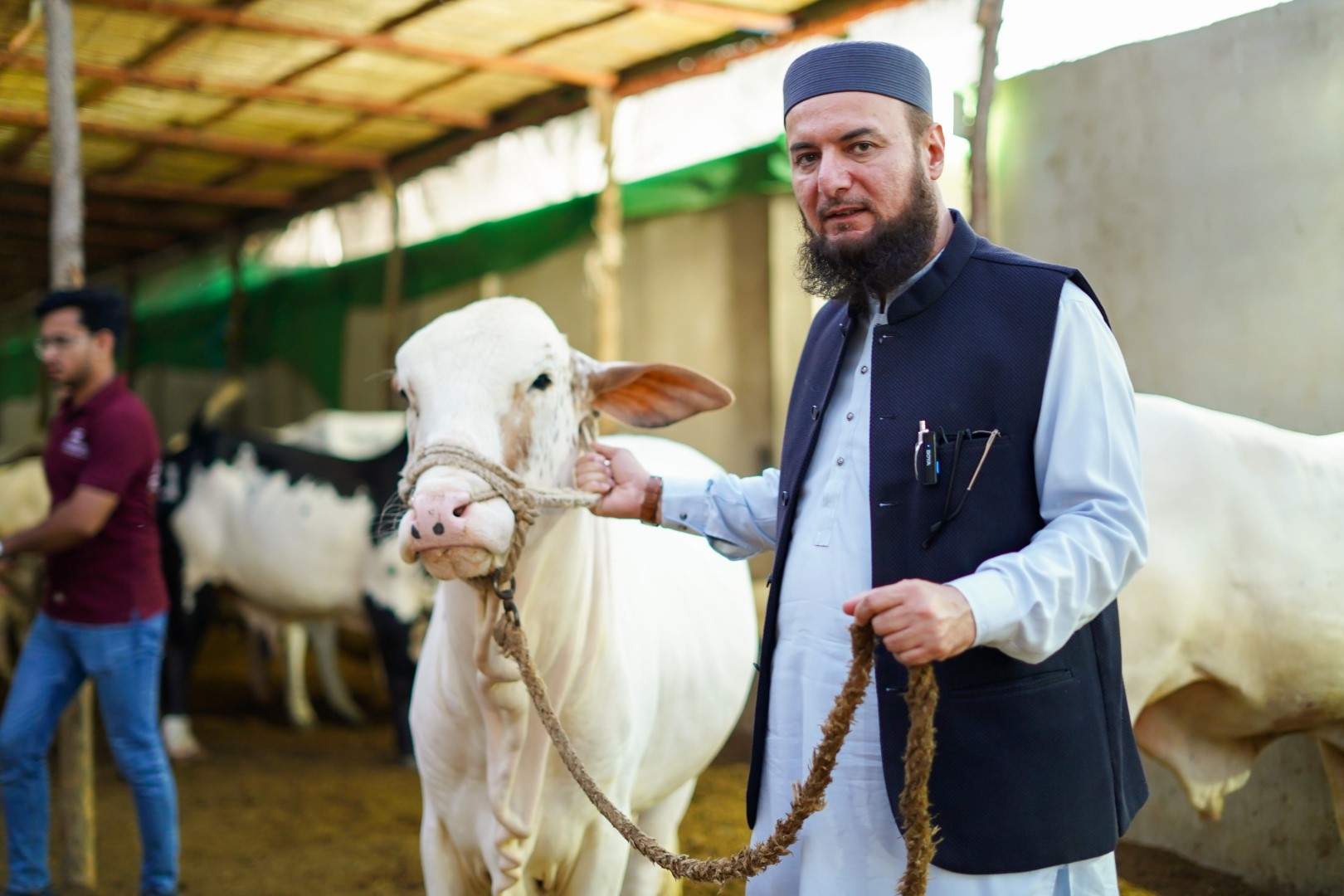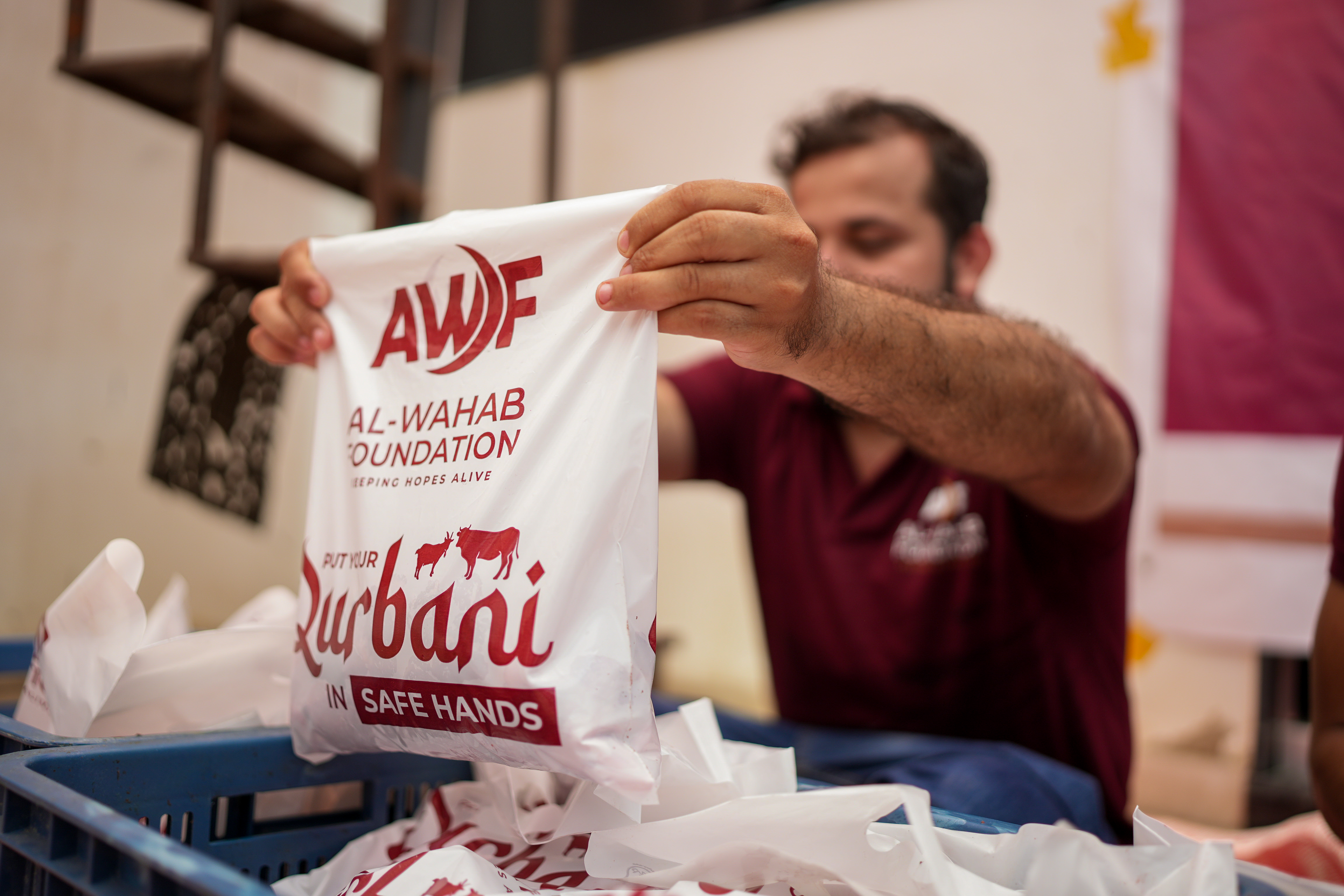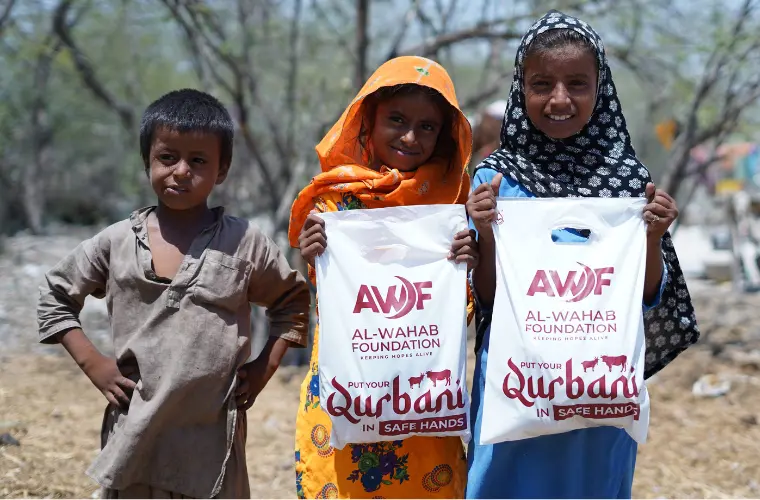Qurbani or sacrifice is a ritual obligated to be performed by Muslims around the world every year in the blessed month of Dhul Hijjah on Eid Al-Adha to revive the Sunnah of Prophet Ibrahim (AS). This Islamic tradition highlights the importance of expressing gratitude, devotion to Allah’s will, and sharing the blessings of this occasion with those who are underprivileged. To understand the meaning of what is Qurbani, here is a brief explanation in the light of Islam.
The Origin and Meaning of Qurbani in Islam
Qurbani, also known as Udhiyah, is a mandatory ritual in Islam that involves the act of sacrificing an animal (goat, lamb, sheep, cow, camel) on Eid Al-Adha. This practice commemorates Prophet Ibrahim’s (AS) devotion and willingness to sacrifice his son Ismail (AS) in obedience to Allah’s command, which was his test of faith and was ultimately replaced with a ram. To understand what is Qurbani, it symbolises submission to Allah’s will, generosity, and showing generosity towards the less fortunate.
The Importance of Qurbani
The meaning of Qurbani can be translated in the spiritual significance of Qurbani which highlights it as a symbolic act of devotion demonstrating a Muslim’s obedience to Allah’s commands. Qurbani is highlighted in the Quran as:
“And the camels and cattle We have appointed for you as among the symbols of Allah. For you, there is good in them. So mention the name of Allah over them when they are lined up for sacrifice, and when they fall down to the ground (after slaughter), eat from them and feed the needy and the poor.” — Surah Al-Hajj (22:36)
Another ayah from the Holy Quran emphasises that it is not the meat that reaches Allah (SWT), but rather the sincere intention behind the sacrifice, as Muslims carry out the act in obedience to Allah’s will:

“It is not their meat nor their blood that reaches Allah, but it is your piety that reaches Him. Thus have We made them subject to you, that you may glorify Allah for His guidance to you. And give good tidings to the doers of good.” — Surah Al-Hajj (22:37)
Beyond its religious value, remember the spirit of what is Qurbani for. It is that occasion which conveys a sense of community by allowing Muslims to share meat with those in need, ensuring the less fortunate can be a part of Eid Al-Adha festivities.

The Story of Qurbani
Eid al-Adha, also known as the Festival of Sacrifice, brings immense joy and holds a significant place in the hearts of Muslims worldwide. This auspicious occasion is deeply rooted in the profound Story of Ibrahim A.S. and Qurbani, Eid, and the extraordinary faith of the Prophet Ibrahim (A.S).
The captivating narratives of what is Qurbani, Eid, and the Sunnah of Prophet Ibrahim (A.S) underscore the invaluable lessons they impart to us. The story of Qurbani reminds us of the significance of sacrifice in our spiritual journey, as we follow in the footsteps of Prophet Ibrahim (A.S) by letting go of our attachments and desires for the sake of Allah.
Why Do Muslims Perform Qurbani?
Muslims across the globe perform Qurbani to revive the Sunnah of Prophet Ibrahim (AS) in its true essence to devote themselves to Allah’s command and willingness. Eid Al-Adha also brings the community together when Muslims share the meat of Qurbani with those in need to show compassion towards the deserving families.
Who Has To Give Qurbani?
For those looking for who has to give Qurbani in the light of Shariah, the majority of scholars agree that Qurbani is a sunnah mu’akkadah (highly recommended) or wajib (obligatory) for every sane Muslim who can afford it. It is separate from Zakat or Sadaqah.
The animals that can be sacrificed include goats, sheep, cattle (cow, ox, buffalo), or camels. Animals chosen for sacrifice must be healthy and free from disease. They must be cared for and treated with kindness and respect.

Is Qurbani Mandatory in Islam?
Muslims frequently ask about is Qurbani mandatory in Islam? Qurbani or Udhiyah is mandatory in Islam for those who are financial stable. If a person owns wealth above the nisab threshold (similar to that of Zakat), they are expected to perform Qurbani. While not mandatory for all, it is a significant act of worship that brings great reward.
Rules and Requirements for a Valid Qurbani
Eligibility
The person offering Qurbani must be a sane, adult Muslim who owns wealth above the nisab threshold (like for Zakat) on Eid al-Adha.
Time of Qurbani
Qurbani must be performed after the Eid prayer on the 10th, 11th, or 12th of Dhul-Hijjah. Sacrifices made before Eid prayer are invalid.
Animals for Sacrifice
The animal must be a goat (1 year), sheep (at least 6 months if healthy), cow (2 years), or camel (5 years), and free from defects like blindness, sickness, or missing limbs.
Meat Shares
One small animal (goat/sheep) equals one Qurbani share. Large animals (cow/camel) can have up to 7 shares.
Method of Qurbani/Sacrifice
The animal must be slaughtered by a Muslim who recites Bismillah, Allahu Akbar at the time of slaughter, and the method should meet Islamic guidelines (cutting throat, windpipe, and blood vessels swiftly).
Meat Distribution
Meat should be divided into three parts i.e. one for the family, one for relatives/friends, and one for the poor/needy.
How to Donate Your Qurbani with Al-Wahab Foundation?
Through Al-Wahab Foundation’s Qurbani Project, together we can spread smiles around by sharing sacrificial meat with the most deserving communities. Your contribution can give hope and nourishment through our Qurbani Appeal while underscoring the real meaning of what is Qurbani.
Online Donation: You can easily Donate to Qurbani Project through our secure online donation portal. No matter how small, your contribution can always make a big difference to those in need.
Our Donation Hotline: Apart from our online portal, you can donate by calling us on our donation hotline at 020 8903 8944.
WhatsApp Contact: You can also contact Al-Wahab Foundation to donate your Qurbani through WhatsApp number at 077 2705 2635.
Join hands with Al-Wahab Foundation and help us transform lives this Eid Al-Adha.
Frequently Asked Questions
1. How Much Qurbani Per Person?
For those frequently asking about how much Qurbani per person, each eligible adult (meeting the nisab threshold) in the family must offer one Qurbani. One small animal equals one share; one large animal can have up to seven shares.
2. Who Can Receive Qurbani Meat?
Qurbani meat can be distributed to three groups: the person offering the sacrifice and their family, friends and relatives, and the poor and needy.
3. Should I Avoid Cutting My Nails and Hair if I’m Giving Qurbani?
Yes, it’s recommended to avoid cutting hair and nails when offering Qurbani. This is because the act of refraining from cutting hair and nails is considered part of the Qurbani ritual, symbolizing humility and focus on the act of sacrifice.
4. What Should I Do If I’ve Missed My Qurbani?
If you have missed Qurbani in a previous year, you can make it up this year by sacrificing an extra animal. Simply calculate how many years you’ve missed, and you will know how many animals you need to sacrifice.
5. How to Distribute Qurbani Meat in Islam?
According to Shariah, Qurbani meat can be distributed to three groups: the person offering the sacrifice and their family, friends and relatives, and the poor and needy.


